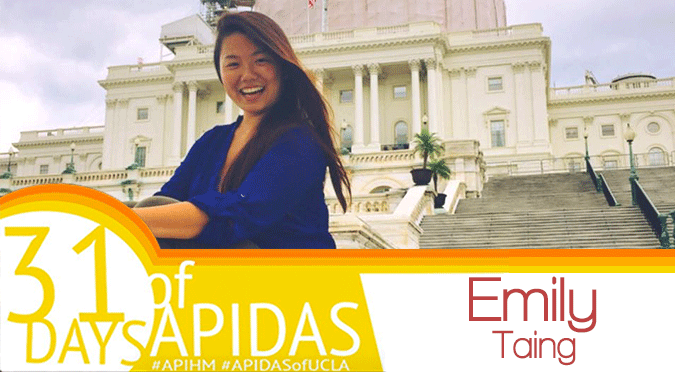Emily Taing is a third year International Development Studies and Asian American Studies double major and European Studies minor student.
How do you identify?
First generation college student. I’m a second-generation API.
How do you think your identity affects your experiences at UCLA?
As a low-income first generation Asian-American, I am reminded by my cultural and ethnic upbringing what a privilege it is to pursue a college education. My parents bestowed upon me a moral responsibility that my education is not just for the benefit of myself but my communities as well. I believe since my time here at UCLA, I strive to take advantage of my education and to increase academic attainment for others.
Are you in any student groups on campus? What are some of your experiences?
At UCLA, my peers and I established a chapter of Teaching and Sharing Skills to Enrich Lives (TASSEL). Together with university students abroad, TASSEL provides online English language education year-round for underserved youth in rural Cambodia. Additionally, we are improving our program by including health education and nurturing support to mirror the needs of this region, which has been deeply fragmented by the Cambodian Genocide. I have also worked for Jumpstart, where I teach preschool students from less developed communities to improve their literacy rates. In addition, I have had some experiences outside of UCLA include internships domestically and internationally in government and non-governmental institutions.
Last fall, I served as a Parliamentary Intern at the Houses of the Oireachtas, Parliament of Ireland, working directly with Teachta Dála (Congressman) Robert Troy, Spokesperson for Children for the Fianna Fáil political party. I worked with constituents in Central Ireland on local safety policies through weekly community organizing projects. I conducted research on key issues related to children including drafting inquiries regarding international surrogacy legislation addressed to the Minister of Justice, and integrating children into the education system who have suffered from the refugee and migrant crisis.
Prior, I worked as an undergraduate legal intern at the Lawyers’ Committee for Civil Rights Under Law in Washington D.C. during summer of 2015 where I conducted research and created memorandums on education trends in school districts nation wide for racial segregation legal cases for associates on Maryland and Louisiana public school litigation.
What’s your favorite part of your culture(s)?
I would have to say the history, as an Asian-American studies major, I find myself seeing a fluidity in identity between Asian-American and Asian. I believe that I identify closely with a 1.5 generation because while I was born in the States, I lived in China for two years. I believe that being able to understand one’s identity allows for critical analysis of historical interpretation of a race. Furthermore, this allows me especially to understand myself and better overcome my own challenges.
What’s your greatest challenge right now?
Being able to balance my own professional and personal aspirations, with what I feel are my cultural obligations to my immigrant parent. I believe the most challenging part is that no matter what others have to say about how I am free to make my own decisions, I find myself rejecting this western mindset of individualism. I believe with time I will find a balance and hopefully be able to fulfill many of my aspirations.
What’s your favorite memory of UCLA?
I believe one of my favorite memories of UCLA was the summer I spent in Washington D.C. During that summer I met some amazing UCLA students and alumni, and I keep in touch with them to this day. These individuals were so passionate about public service that I knew that I chose the right school for me to fulfill my goals.
What are you passionate about and why?
I am passionate about international affairs, specifically education and human rights. I believe these two topics go hand in hand when it comes to addressing some of the world’s largest political, economical and social issues. Furthermore, innovation in all sectors globally cannot be attain if education and human rights are not held to a high standard.
What is on your bucket list?
I would like to visit 100 countries in my lifetime. So far I have been to 12 countries, excluding the countries I have had layovers in!

Comments are closed.